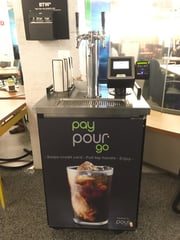The DMV, amusement parks, and your local bar -- the perfect trifecta of long lines that are sure to provide you with endless hours of boredom and frustration. In fact, there’s an app where you can hire someone to wait in line for you, but then, why not eliminate the wait altogether? That’s what Josh Goodman is doing with his company, PourMyBeer. If you’re sick of waiting for the bartender to come back with your drink, you’re in luck -- now you can do it yourself.

It’s Saturday night and you’ve just met your friends at the bar; you sit down, order a drink, and patiently wait for nearly half-an-hour until it arrives. At some point, you probably thought to yourself -- what if I just poured the whole thing myself?
That’s exactly how Josh Goodman, Founder and CEO of PourMyBeer, felt when he would go out with his friends. Spurred by an interest in entrepreneurship, Goodman considered building a platform that would give patrons the ability to pour their own drinks.
“I met up with some friends at a bar and I was obsessively looking for a problem big enough to solve so I could build a business around it. I realized we’d been waiting for our first round of beers for about 30 minutes and asked ‘why can’t we just pour our own drinks?’ Instead of waiting for that beer, I left my friends at the bar to jot down some ideas on how I could solve this problem on a PowerPoint presentation. My original idea resembled an age verifying, credit card processing ATM for Beer.”
And as quickly as his idea took shape, Goodman left his job at an IT staffing company and launched his first company, Innovative Tap Solutions. The first model, which Goodman admits ‘required more work,’ secured the interest of a number of bar owners -- but unfortunately, also required heavy reconstruction to install.
Learning from his first iteration, Goodman began work on his next idea; a mobile draft beer table that could easily travel around. Most importantly, the table wouldn’t require the type of reconstruction that a fixed unit would. After investing $10,000 into his own product, Goodman started to secure customers, but the mobile beer table still had its problems.
“We had tech troubles and delivery issues, and we ended up sinking a lot of money into R&D. It definitely had its problems, but I learned a lot after that experience. I knew I could take those lessons and turn them into something valuable.”
Goodman abandoned the mobile beer platform, but using insights from his first two ventures, he started work on a new company. After going down a list of names, he settled on a title that was both simple and self-explanatory -- PourMyBeer.
As the saying goes, the third time’s the charm.
“It took a few years to keep going and there were a lot of rough patches at the beginning. There were times when I was at rock-bottom. I didn’t lose faith though and that’s because you have to believe in your idea as a founder and also because you’ve bet your entire life savings on what you’re doing. I’m glad I stayed with it because we’re really firing on all cylinders right now.”
He’s right -- PourMyBeer has tripled its annual sales over the last two years and customer acquisition is up by more than 400 percent. In fact, the company currently has more than 3,000 taps in service. Goodman credits much of his company’s success to its ease of use. With PourMyBeer, customers head to the bar, present their IDs to verify their age, and link their payment to an RFID card. Using the RFID card, patrons choose their favorite beer and start pouring, where they are charged by the ounce.
“We’re using technology to reduce the layers it takes to get customers a drink. Traditionally, there’s been seven layers. You go to the bar, you wait to get seated, you wait for a server, you place an order, your server takes that order at the point of sales -- which then gets sent to the bar as a ticket -- and then finally, the drink is made and delivered. All of that is very archaic and it can also take awhile, so while we’re selling convenience, we’re also selling time.”
And time is an essential resource for Goodman because unlike money, you can’t make more hours in your life. That’s why he’s so careful to spend it in the right places.
“I remember reading Rich Dad, Poor Dad and it said that when you go into an industry, you should find someone who’s an expert there and ask to work for them for free. I’ve worked with a number of different owners and in the beer distribution industry and I’ve done it for free. I can honestly say that it was a great use of my time. I wasn’t getting paid, but I learned so much from that experience and I was able to bounce ideas off the people that I worked for and that alone was worth its weight in gold.”
One vital lesson that Goodman has learned during his entrepreneurial journey is that community is key. It’s one of the main reasons why he joined 1871.
“Bumping into people is a necessity -- especially if you’re a rapid-growth company. On any given day here, you might be sitting next to your future COO or CTO, you really never know, but just being in a community of like-minded people means that you’ll have more benefits than if you were stuck in an office somewhere.”
And speaking of benefits, Goodman’s brought his own gifts; a full-on cold brew machine that helps sleep-deprived entrepreneurs go a couple more rounds before retiring to bed. Nested in 1871’s shared space, PayPourGo (powered by PourMyBeer) runs a coffee kegerator that shares a similar model to its more intoxicating counterpart -- simply swipe your credit card, pull the tap handle, and you’ll be charged per ounce. No line, no wait, just coffee when you want it.
sleep-deprived entrepreneurs go a couple more rounds before retiring to bed. Nested in 1871’s shared space, PayPourGo (powered by PourMyBeer) runs a coffee kegerator that shares a similar model to its more intoxicating counterpart -- simply swipe your credit card, pull the tap handle, and you’ll be charged per ounce. No line, no wait, just coffee when you want it.
Although he didn’t see himself expanding into the cold brew coffee industry just a few years ago, Goodman knows that building and running a business can be summed up in four words: roll with the punches.
“There’s no straight line or quick way. People like to say that success is a process and not a destination and it’s true, but it sounds a bit like a cliche. What they really mean is that your mindset will constantly change. When you first start a business, you’re going to be in survival mode. If your business grows, you’re going to shift gears and focus on a different set of things like expansion and customer acquisition, so whatever your original plan was, it’s probably shifted. You have to adapt and to some extent, enjoy that process.”
1871 provides work space, education, resources, and curated connections to help Chicago's entrepreneurs build and scale their business.



